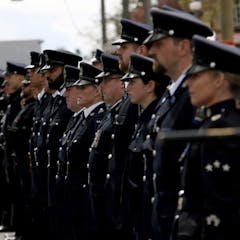
Articles on Police brutality
Displaying 21 - 40 of 119 articles

In the face of violent crime, both real and imagined, too many U.S. police forces adhere to racist philosophies about rooting out ‘internal enemies’ as they did hundreds of years ago.

A pervasive history of bullying and sexual misconduct plagues law enforcement agencies and illustrates the failure of police forces to police themselves.

Black police officers can have bias against Black people – and act on it.

The death of a Black motorist after a beating by five Black Memphis police officers has triggered national outrage over police brutality and systemic racism with the U.S. criminal justice system.

When communities face security challenges and lack legal protection, they find innovative ways to respond.

Black Twitter is often the preferred forum for candid and authentic Black-centered discussions on police brutality. Without it, holding police accountable may become even more difficult.

For disproportionate policing to be effectively tackled, it is vital to understand the fear and hurt it creates.

New research on police departments across the country reveals a significant link between the use of fatal force and college education – the more educated are less likely to use it.

In today’s episode, we look at how sound and noise are used as tactics of protest and how practitioners are using environmental soundscapes to protest against racism and police brutality.

The Toronto Police Service chief apologized to the public for the findings of an investigation that demonstrated the Toronto police’s excessive use of force on racialized residents.

Has the defund the police movement had an impact in Canada? It depends on how you define success.

The greedy tendencies of police departments help illustrate why public police funding is a major problem today in Canada and the United States.

Discussions of racism in Britain centre around the experiences and traumas of Black people, but rarely on the perpetrators.

School districts across the nation are wrestling with whether to have police officers on school grounds.

Perceptions that South African police treat people disrespectfully, lack impartiality or transparency, and are prone to brutality
undermine public confidence in them.

Police reforms have long been on the agenda of Kenya’s independence regimes, but progress remains painfully slow.

The continued reliance on outdated indicators of police performance reinforce conventional ideas of police sustainability rather than align with the concerns of “defund the police” advocates.

Young people’s use of technology such as Twitter shows that they are interested in politics and governance and have found a way to participate.

Brady taking a knee is counter to both the man and the league. Nonetheless, had he done so, he would have been received much more favourably.

One year after the #EndSARS protests, not much has come out of the investigations into the shootings and deaths that occurred across the country.
